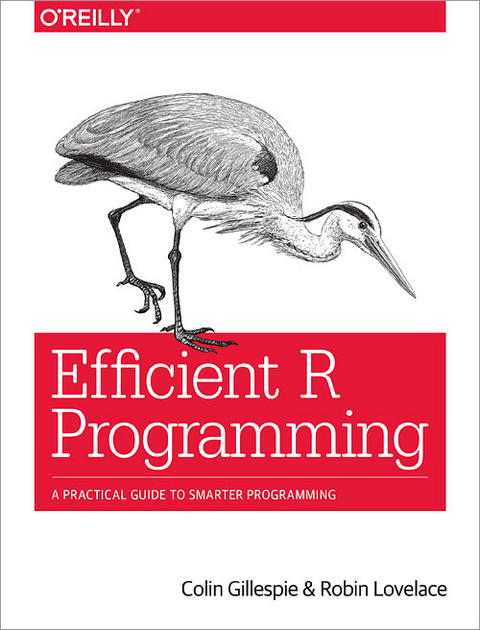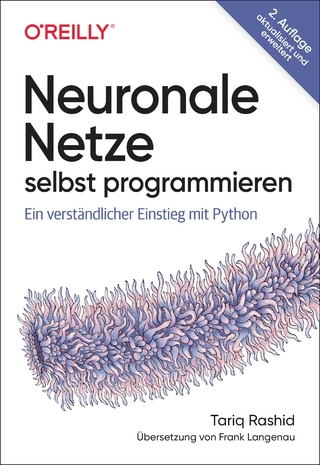
Efficient R Programming
O'Reilly Media (Verlag)
978-1-4919-5078-4 (ISBN)
Drawing on years of experience teaching R courses, authors Colin Gillespie and Robin Lovelace provide practical advice on a range of topics—from optimizing the set-up of RStudio to leveraging C++—that make this book a useful addition to any R user’s bookshelf. Academics, business users, and programmers from a wide range of backgrounds stand to benefit from the guidance in Efficient R Programming.
Get advice for setting up an R programming environment
Explore general programming concepts and R coding techniques
Understand the ingredients of an efficient R workflow
Learn how to efficiently read and write data in R
Dive into data carpentry—the vital skill for cleaning raw data
Optimize your code with profiling, standard tricks, and other methods
Determine your hardware capabilities for handling R computation
Maximize the benefits of collaborative R programming
Accelerate your transition from R hacker to R programmer
Colin Gillespie is Senior lecturer (Associate professor) at Newcastle University, UK. He has been running R courses for over five years at a variety of levels, ranging from beginners to advanced programming. During his academic career, he has also been employed as an external consultant at Shell, Burberry, Yorkshire Bank, KPMG, and Tesco Bank. His research interests are high performance statistical computing and Bayesian statistics. Robin Lovelace is a Research Fellow in the Leeds Institute for Data Analytics, which specializes in the handling of large data sets. Robin has five years using R for academic research and three years teaching R at all levels. Robin developed the popular tutorial "Introduction to visualizing spatial data in R" and is working to publish "Spatial microsimulation with R" (CRC Press). Robin has used R on mission-critical contracts, including the creation of a nationally scalable interactive online mapping tool for the UK's Department for Transport (DfT).
Chapter 1Introduction
Prerequisites
Who This Book Is for and How to Use It
What Is Efficiency?
What Is Efficient R Programming?
Why Efficiency?
Cross-Transferable Skills for Efficiency
Benchmarking and Profiling
Book Resources
References
Chapter 2Efficient Setup
Prerequisites
Top Five Tips for an Efficient R Setup
Operating System
R Version
R Startup
RStudio
BLAS and Alternative R Interpreters
References
Chapter 3Efficient Programming
Prerequisites
Top Five Tips for Efficient Programming
General Advice
Communicating with the User
Factors
The Apply Family
Caching Variables
The Byte Compiler
References
Chapter 4Efficient Workflow
Prerequisites
Top Five Tips for Efficient Workflow
A Project Planning Typology
Project Planning and Management
Package Selection
Publication
Reference
Chapter 5Efficient Input/Output
Prerequisites
Top Five Tips for Efficient Data I/O
Versatile Data Import with rio
Plain-Text Formats
Binary File Formats
Getting Data from the Internet
Accessing Data Stored in Packages
References
Chapter 6Efficient Data Carpentry
Prerequisites
Top Five Tips for Efficient Data Carpentry
Efficient Data Frames with tibble
Tidying Data with tidyr and Regular Expressions
Efficient Data Processing with dplyr
Combining Datasets
Working with Databases
Data Processing with data.table
References
Chapter 7Efficient Optimization
Prerequisites
Top Five Tips for Efficient Optimization
Code Profiling
Efficient Base R
Example: Optimizing the move_square() Function
Parallel Computing
Rcpp
References
Chapter 8Efficient Hardware
Prerequisites
Top Five Tips for Efficient Hardware
Background: What Is a Byte?
Random Access Memory
Hard Drives: HDD Versus SSD
Operating Systems: 32-Bit or 64-Bit
Central Processing Unit
Cloud Computing
Chapter 9Efficient Collaboration
Prerequisites
Top Five Tips for Efficient Collaboration
Coding Style
Version Control
Code Review
References
Chapter 10Efficient Learning
Prerequisties
Top Five Tips for Efficient Learning
Using R’s Internal Help
Online Resources
Asking a Question
Learning In Depth
Spread the Knowledge
References
Appendix Package Dependencies
Appendix References
| Erscheinungsdatum | 12.01.2017 |
|---|---|
| Verlagsort | Sebastopol |
| Sprache | englisch |
| Maße | 180 x 233 mm |
| Gewicht | 386 g |
| Einbandart | kartoniert |
| Themenwelt | Informatik ► Datenbanken ► Data Warehouse / Data Mining |
| Mathematik / Informatik ► Informatik ► Theorie / Studium | |
| Mathematik / Informatik ► Mathematik ► Statistik | |
| Schlagworte | Datenanalyse mit R • Programmieren mit R |
| ISBN-10 | 1-4919-5078-1 / 1491950781 |
| ISBN-13 | 978-1-4919-5078-4 / 9781491950784 |
| Zustand | Neuware |
| Informationen gemäß Produktsicherheitsverordnung (GPSR) | |
| Haben Sie eine Frage zum Produkt? |
aus dem Bereich


